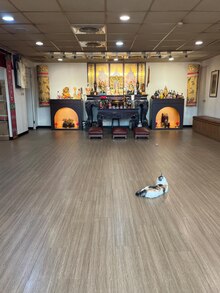Wei-ming temple
| Wei-ming temple | |
|---|---|
威明堂 | |
 Shrine dedicated to Tu'er Shen in the Wei-ming temple | |
| Religion | |
| Affiliation | Taoist |
| Deity | Tu'er Shen, other Taoist deities |
| Location | |
| Location | New Taipei City, Taiwan |
Wei-ming temple (Chinese: 威明堂; pinyin: Wēi míngtáng),[1] also known as Rabbit Temple, is a Taoist temple in New Taipei City, Taiwan dedicated to Tu'er Shen (lit. "The Rabbit God"), a Chinese deity associated with gay love and sex.[2]
History
[edit]
Founded by Taoist priest Lu Wei-ming in 2006, the shrine is explicitly welcoming to gay congregants, and draws about 9,000 attendees per year.[2] According to Wei-ming, the temple is the only shrine in the world dedicated to homosexuals, and has stated that his intent in creating the shrine was to create a welcoming place for a demographic subject to ostracism. While praying to the gods for a lover is a traditional Taoist custom, the Wei-ming temple's focus on sexuality is distinct, and a symbol of queer identity in Taiwanese society.[2][3] The temple has been the target of sporadic protests by Taiwan's small Christian community,[2] with a priest attempting to perform an exorcism of the shrine on one occasion.[4]
See also
[edit]References
[edit]- ^ Scene, Taiwan (2019-10-05). "Ultimate Taipei LGBT Map". Taiwan Scene. Retrieved 2023-06-29.
- ^ a b c d Gold, Michael (2015-01-19). "Taiwan's gays pray for soul mates at 'Rabbit' temple". Reuters. Retrieved 2023-06-29.
- ^ Davidson, Helen; Lin, Chi Hui (2023-03-07). "How a rabbit god became an icon for Taiwan's gay community". The Guardian. ISSN 0261-3077. Retrieved 2023-06-29.
- ^ "Thousands Of Gay Pilgrims Trek To Taiwan To Pray For Love At "Rabbit" Temple". www.logotv.com. Retrieved 2023-06-29.
